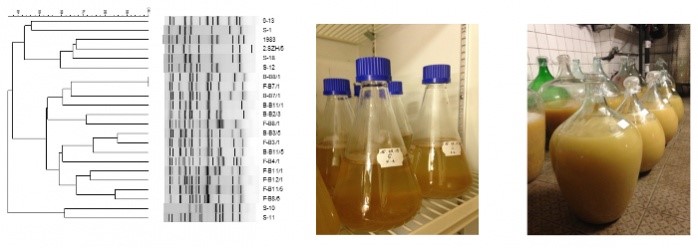Microbial Biotechnology and Microbiomics Group - Detailed - Institute of Genetics and Biotechnology
Microbial Biotechnology and Microbiomics Group
Microbial Biotechnology and Microbiomics Group - Detailed
Last modified: 16. February 2026
Research topics:
- Isolation and characterization of microorganisms with probiotic potential from gut content of wild boars to develop probiotics for swine industry
- Development of new yeast starter cultures highlighting the local character of the wines of the Balaton Wine Region and their integration into the winemaking technology
- Investigation of changes of microplastic particles in the composition of the gut microbiota and health status of rabbits
- Research projects investigating antibiotic resistance from different aspects
- A. Detection of acquired antibiotic resistance and investigation of its occurrence in environmental samples
- B. Development of alternatives to antibiotics for animal husbandry
- Examination of the symbiotic relationships formed by arbuscular mycorrhizal fungi focusing on the biotic and abiotic stress tolerance of the plant.
Development of environmentally friendly soil inoculum with the isolation and research on beneficial microbes to boost nutrient uptake and tolerance of Solanaceae plants against main pathogens of the family and climate change induced abiotic stresses.
Research topics:
Isolation and characterization of microorganisms with probiotic potential from gut content of wild boars to develop probiotics for swine industry.
Microorganisms living in the gastrointestinal tract of animals comprise the microbiota. Proper composition of a balanced microbial community is prerequisite of healthy life, while perturbation in the gut microbiota can lead to disease development. However, there are microorganisms, called probiotics, which can promote maintenance or help to regain of conditions required for functioning of a normal gut flora.
Pig production at industrial scale can generate different health problems, some of them could be solved by using probiotics in a form of feed additives. One of our goals is to isolate key microorganisms with probiotic potential from gut content of wild boars to develop probiotics for swine industry to aid efficient food production. Metagenomic analyses are performed to obtain information about the microbial profile of different gut regions in wild boars.
Health promoting features of probiotics are strain specific and the strains have to fulfill several criteria. Isolates have to be identified at species level, their stress (pH- and bile salt) tolerance must be measured, antimicrobial activity against different pathogens were determined. To address safety features, blood hemolytic activity of the strains were tested, the presence of bile salt hydrolase (BSH) activity and antibiotic susceptibility were determined. Genome sequence of several strains was determined. Bioinformatic analyses indicated that none of them had any known acquired antibiotic resistance genes. Genes for bacteriocin production and mucin adhesion were identified.
Our coming plan is to perform feeding experiments with a couple of selected strains to prove their probiotic capability in vivo. In case of positive results we plan to enter into the product development stage.
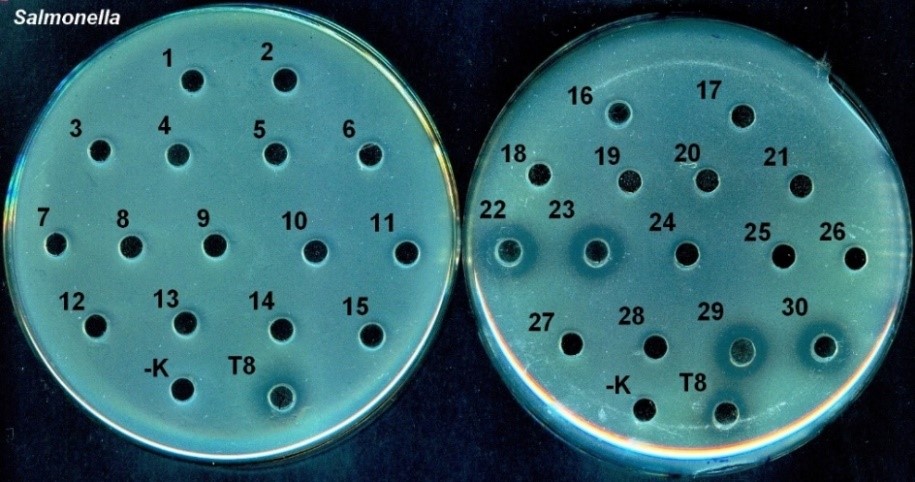
Fig. 1 Plates from testing antimicrobial activity of Lactobacillus
strains against a pathogen Salmonella strain
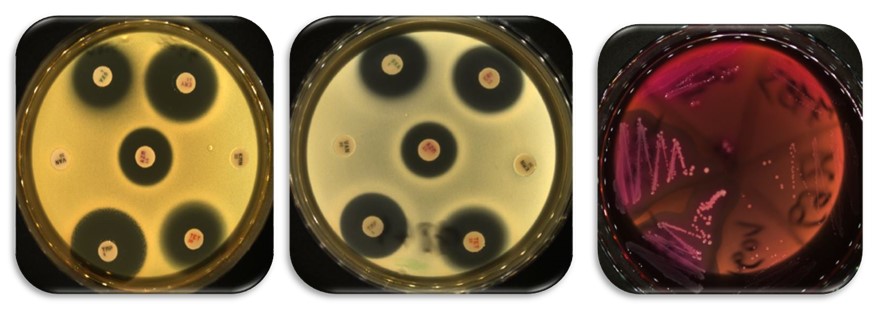
Fig. 2 Antibiotic susceptibility determination by disc diffusion method and detection of hemolytic activity on blood agar plates.
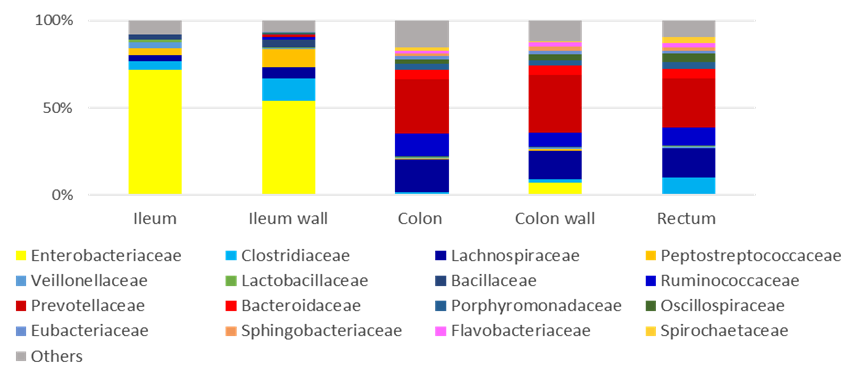
Fig. 3 Family level bacterial composition of microbiota in different gut regions of a wild boar.
Development of new yeast starter cultures highlighting the local character of the wines of the Balaton Wine Region and their integration into the winemaking technology
One of the key elements of modern winemaking technology is the controlled fermentation, which can be achieved by using starter yeast cultures that allow fermentation processes to be well controlled, fermentation times to be shortened and alcohol to be produced more quickly. However, their use is less likely to enhance the individual character of the wines. A number of these starter yeasts are commercially available, usually derived from natural populations found in the environment.
The different wine regions are characterised by a microbial community specific to the area, which, adapted to the environmental conditions, play a decisive role in the fermentation of local wines (spontaneous fermentation). In addition to alcoholic fermentation, yeasts contribute to the character of wines by synthesising their secondary metabolites. The growing market for "terroir" wines has opened the way to research into indigenous, so-called autochthonous yeast strains. In addition to local climate, environmental factors, soil cultivation and oenological technology, the yeast strains that ferment the wine also contribute to the terroir character.
Our aim is the isolation, microbial, molecular, genomic and metagenomic analysis of yeast strains typical of the Badacsony Wine Region. Our long-term goal is to identify the selected strains, to determine their most important characteristics and to create starter cultures based on the fermentation experiments.
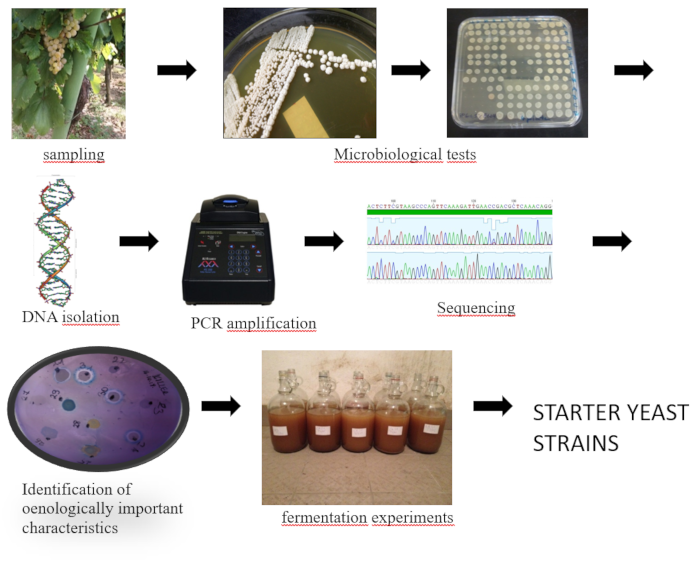
| Development of starter yeast strains | |
|
|
| Distribution of isolated yeasts based on region delta analysis | Laboratory level and microvinification experiment using isolated terroir yeasts |
Investigation of changes of microplastic particles in the composition of the gut microbiota and health status of rabbits
Nowadays, there is increasing attention on the harmful, polluting effects of plastics and how to protect against them. In this field, relatively little attention has been paid to the effects of microplastics on the gut microflora. The aim of our project is to investigate these effects using a complex approach (genomics, microbiology, physiology, toxicology, reproductive biology) in rabbits.
Microplastics are ubiquitous as pollutants. Our project investigates the changes caused by plastic particles in farm animals for human consumption, in this case rabbits. Microplastic particles in the gut alter the composition of the microbiota. The imbalance of microbiota leads to the development of metabolic diseases, adversely affecting the development of the animal and thus the efficiency and profitability of the breeding. Since small plastic particles also enter the blood and other tissues of the body, they pose a significant burden and health risk when ingested into the human body through food consumption. The knowledge gathered in our study is essential to assess this and to find solutions.
Main tasks of the project: (i) Effect of microplastic stress on the microbiota and physiology of rabbits (ii) Isolation of microplastic degrading bacteria (iii) Investigation of the isolated plastic degrading microorganism and their communities (iv) Effect of plastic degrading bacteria in plastic stressed rabbits.
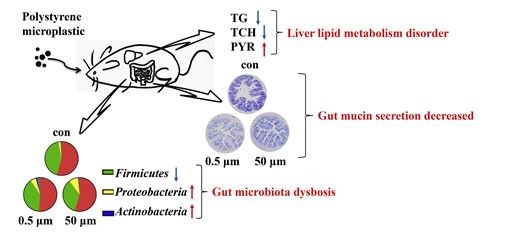
Microbiota dysbiosis and physiological changes after microplastic exposure
(Lu et al., 2018).
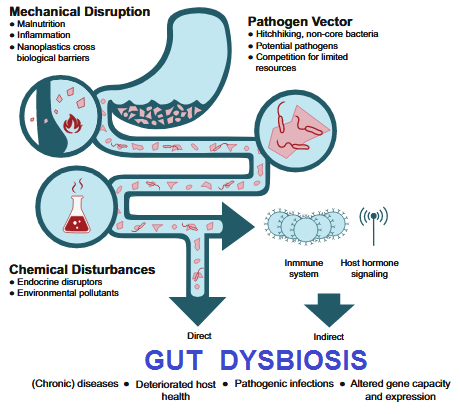
Potential effects of microplastic intake and a conceptual model
of the mechanisms leading to gut dysbiosis
(Fackelmann and Sommer 2019).
Research projects investigating antibiotic resistance from different aspects
A. Detection of acquired antibiotic resistance and investigation of its occurrence in environmental samples
In 2017, the European Union announced an action plan to combat antimicrobial resistance (AMR). The “One Health” principle of the Action Plan highlights that human and animal health are interlinked, resistant bacteria can spread from humans to farm animals and vice versa, and includes the study of the environment as well, which can also be a source of AMR. In accordance with these European Union recommendations faecal samples of farm animals and environmental samples are screened for the presence of antibiotic-resistant bacteria, and the cultured antibiotic-resistant strains are characterized using molecular and classical microbiological methods within the National Laboratory of Agribiotechnology and Precision Breeding for Food Security and through international cooperation.
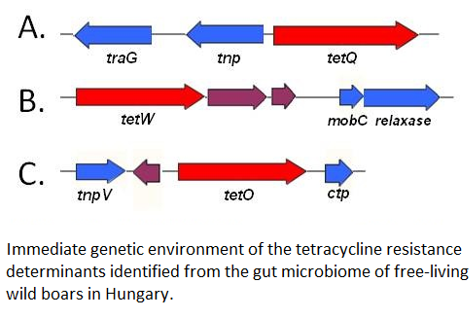
B. Development of alternatives to antibiotics for animal husbandry
Antimicrobial resistance (AMR) emerges naturally over time usually through genetic changes. However, the misuse or overuse of antibiotics is accelerating this process. AMR may place the gains of the Millennium Development Goals at risk and also endangers the achievement of the Sustainable Development Goals. In order to fight against AMR, NeoGiANT is aimed to develop novel natural antimicrobial products for the control and prevention of certain infectious diseases in animal production based on natural extracts derived from agri-food byproducts as raw materials. The use of alternative products shall relegate antibiotics to the treatment of acute infections and shall reduce their current prophylactic use. These natural extracts based new products are aimed to avoid the growth of microorganisms and also improve the health and welfare of animals. The NeoGiANT Horizon 2020 project is based on the use of such biomass sources (white grape marc) that can provide cost-effective, efficient and green solutions to obtain functional ingredients in sustainable circular economy production systems.
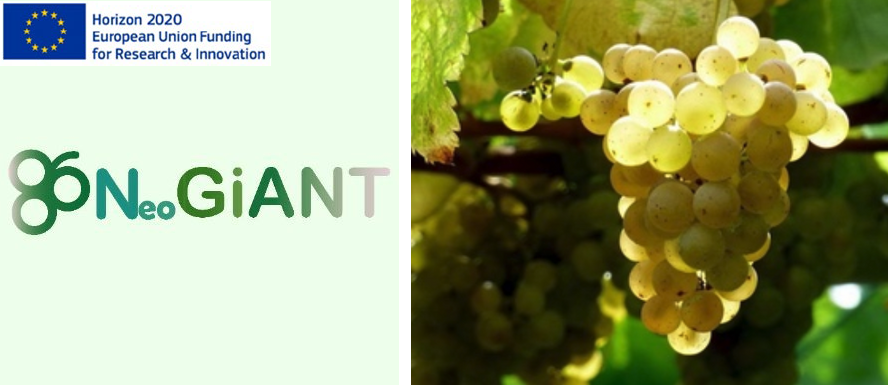
Examination of the symbiotic relationships formed by arbuscular mycorrhizal fungi focusing on the biotic and abiotic stress tolerance of the plant.
This work focuses on arbuscular mycorrhizal (AM) fungi, which play a central role in natural and artificial ecosystems, supplemented with studying (i) their diversity (ii) connection to “helper” bacteria and other rhizosphere microorganisms involved in nutrient cycling as well as (iii) the relationship between mycorrhizal and plant pathogenic fungi. We analyse the effects of different agrotechnical methods on AM diversity by molecular methods, offering recommendations for environmentally friendly agricultural technologies that can be used in practice. To investigate the role of the AM fungi in the enhancement of the host plants resistance to pathogens, genes involved in the defense processes are examined by classical and molecular microbiological methods. The aim of our work is to promote their use in biological control and environmentally friendly agriculture by learning about how mycorrhizal fungi increase plant resistance. We also analyze the biotic and abiotic stress effects that significantly influence the activity of mycorrhizal fungi and other soil microorganisms, supplementing the investigations of the complex plant-AM-soil microorganisms interactions. Besides the previously described direct effect of AM on toxinogenic fungi their effect on toxin production is also monitored, with particular emphasis on Fusarium toxins.
Development of environmentally friendly soil inoculum with the isolation and research on beneficial microbes to boost nutrient uptake and tolerance of Solanaceae plants against main pathogens of the family and climate change induced abiotic stresses
One of the biggest challenges agricultural production faces is the minimization of economic losses caused by the by extreme weather induced effects. Climate change and global warming cause problems all around the world, moreover the global trend of these changes is exceeded in Hungary. Uneven rainfall distribution and salinization are among these changes that particularly demand attention. In addition, temperature stress also makes it difficult to obtain the desired yield. Besides the abiotic stress effects listed, the yield and quality of the crop is detrimented by the infection of pathogens. In order to avoid or decreased losses, it is crucial to grow plants with higher resistance to these stress effects. One way to achieve this goal can be through microbiological methods.
In our international collaboration the aim is to carry out research and to exchange knowledge with the Vietnamese partner (Nong Lam University, Ho Chi Minh) that can be used in the development of the soil inoculant product. The purpose of the Hungarian partner (MATE) is to isolate and test microorganisms that can be utilized in the product developed. Testing microorganisms involved in stress tolerance and biological control, and sharing know-how with the Vietnamese partner institution as the development of such a soil inoculant fills a market gap in the Vietnamese market.
Selected Publications
Gerőcs, A.; Nagy, T.; Nemes-Barnás, K.; Májer, J.; Szőke, B.; Kővágó, R.; Magalhães, F.; Gibson, B.; Szekeres, A.; Juhász, Á.; Posta K. and Olasz F. (2022) Characterization of Saccharomyces Strains Isolated from “Kéknyelű” Grape Must and Their Potential for Wine Production. Fermentation 2022, 8, 416. https://doi.org/10.3390/fermentation8080416 Q1, IF: 3.975
Olasz F, Szabó M, Veress A, Bibó M, Kiss J. (2022) The dynamic network of IS30 transposition pathways. PLoS One 17(7): e0271414. doi: 10.1371/journal.pone.0271414 . Q1, IF: 3.752
Zsuzsanna J. Sándor, Vojislav Banjac, Strahinja Vidosavljević, Jenő Káldy, Robert Egessa, Éva Lengyel-Kónya, Rita Tömösközi-Farkas, Zsolt Zalán, Nóra Adányi, Balázs Libisch, and Janka Biró (2022). Aquaculture Nutrition Volume 2022, Article ID 4717014, https://doi.org/10.1155/2022/4717014 Q1, IF: 3.786
Libisch, B., Picot, C., Ceballos-Garzon, A., Moravkova, M., Klimesová, M., Telkes, G., Chuang, S. T., & Le Pape, P. (2022). Prototheca Infections and Ecology from a One Health Perspective. Microorganisms, 10(5), 938. https://doi.org/10.3390/microorganisms10050938 IF: 4.926
Tibor Nagy, Ama Szmolka, Tímea Wilk, János Kiss, Móni Szabó, Judit Pászti, Béla Nagy, Ferenc Olasz* Comparative genome analysis of Hungarian and global strains of Salmonella Infantis Frontiers in Microbiology 2020 Apr 3;11:539. doi: 10.3389/fmicb.2020.00539. eCollection 2020. IF: 4,235
Balázs Libisch*, Tibor Keresztény, Zoltán Kerényi, Róbert Kocsis, Rita Sipos, Péter P. Papp and Ferenc Olasz Metagenomic analysis of the gut microbiota of free-living wild boars (Sus scrofa) identifies acquired antibiotic-resistance determinants prevalent in domestic animal populations -preliminary results. Journal of Veterinary Research, 64(1), 111–118. https://doi.org/10.2478/jvetres-2020-0015 eCollection 2020 Mar. IF: 1.744
Annamária Gerőcs, Katalin Nemes-Barnás, Sára Pál, Barna Szőke, János Májer, Tibor Farkas & Ferenc Olasz* Isolation and characterization of yeast strains from Badacsony, Hungary, Indian Journal of Experimental Biology Vol. 58, July 2020, pp. 461-473 IF: 0.783
Szabó Mónika, Tibor Nagy, Tímea Wilk, Tibor Farkas, Anna Hegyi, Ferenc Olasz, János Kiss*. Characterization of two multidrug-resistant IncA/C plasmids from the 1960s by using Oxford Nanopore MinION sequencer device. Antimicrob Agents Chemother. 2016 Sep 6. pii: AAC.01121-16. [Epub ahead of print] IF: 4.415
Kiss János, Péter Pál Papp, Mónika Szabó, Tibor Farkas, Gábor Murányi, Erik Szakállas and Ferenc Olasz* (2015) The master regulator of IncA/C plasmids is recognized by the Salmonella Genomic island SGI1 as a signal for excision and conjugal transfer Nucleic Acid Reserach 2015 Oct 15;43(18):8735-45. doi: 10.1093/nar/gkv758. Epub 2015 Jul 24.. IF.: 9,202
Juhász, Á., Molnár-Nagy, V., Bata, Z., Tso, K. H., Mayer, Z., Posta, K. (2022). Alternative to ZnO to establish balanced intestinal microbiota for weaning piglets. PloS one, 17(3), e0265573. https://doi.org/10.1371/journal.pone.0265573 IF: 3.240
Mayer, Z., Csorbainé, A.G., Juhász, Á., Ombódi, A., Pápai, A., Némethné, B.K., Posta, K. (2021). Impact of Soil-Applied Microbial Inoculant and Fertilizer on Fungal and Bacterial Communities in the Rhizosphere of Robinia sp. and Populus sp. Plantations. Forests, 12, 1218. https://doi.org/10.3390/f12091218 IF: 2.633
Duc, N. H., Vo, A. T., Haddidi, I., Daood, H., Posta, K. (2020). Arbuscular mycorrhizal fungi improve tolerance of medicinal plant Eclipta prostrata (L.) and induce major changes in polyphenol profiles under salt stresses. Frontiers in Plant Science, 11, 2209. https://doi.org/10.3389/fpls.2020.612299 IF: 5.753
Mayer, Z., Juhász, Á., Posta, K. (2019). Mycorrhizal root exudates induce changes in the growth and fumonisin gene (FUM1) expression of Fusarium proliferatum. Agronomy, 9, 291. (Q1) IF: 2.259
Mayer, Z., Sasvári, Z., Szentpéteri, V., Pethőné Rétháti, B., Vajna, B., Posta, K. (2019). Effect of long-term cropping systems on the diversity of the soil bacterial communities. Agronomy, 9(12), 878. https://doi.org/10.3390/agronomy9120878 IF: 2.259
Sasvári, Z., Hornok, L. and Posta, K. The community structure of arbuscular mycorrhizal fungi in roots of maize grown in a 50-year monoculture. Biol Fertil Soils 47, 167–176 (2011). https://doi.org/10.1007/s00374-010-0519-z IF: 2.319
N.H. Duc ; Zs. Csintalan ; K.Posta 2018 Arbuscular mycorrhizal fungi mitigate negative effects of combined drought and heat stress on tomato plants. PLANT PHYSIOLOGY AND BIOCHEMISTRY 132 pp. 297-307. https://doi.org/10.1016/j.plaphy.2018.09.011 , IF: 3.32
Hegyi, A., Nguyen, T. B. K., Posta, K. (2021). Metagenomic Analysis of Bacterial Communities in Agricultural Soils from Vietnam with Special Attention to Phosphate Solubilizing Bacteria. Microorganisms, 9(9), 1796. https://www.mdpi.com/2076-2607/9/9/1796 IF: 4.128
Szentpéteri, V., Mayer, Z., Posta, K. (2022). Mycorrhizal symbiosis-induced abiotic stress mitigation through phosphate transporters in Solanum lycopersicum L. Plant Growth Regul 2022. doi: 10.1007/s10725-022-00906-w. IF: 3.412
The main projects of the group:
OTKA K-142974 Period: 2022-10-01 - 2026-09-30 Evaluation of resistance strategies based on arbuscular mycorrhizae-induced in tomato against powdery mildew and viral pathogens.
Supervisor: Katalin Posta
Participants: Endre Barta, Zoltán Mayer, Nguyen Hong Duc, Viktor Szentpéteri
Amount: HUF 23 984 thousand Ft
RRF-2.3.1-21-2022-00007, Period: 2022-03-01 - 2026-02-28 Agribiotechnology and Precision Breeding for Food Security National Laboratory
Consortium leader: Ervin Balázs
Supervisor: Katalin Posta
Participants: Ferenc Olasz, Balázs Libisch, Péter Papp, Tibor Keresztény, Ákos Juhász, Tibor Nagy, Viktor Szentpéteri, Zoltán Mayer
Grant requested for the group: 430 000 000 Ft
VKE, Development of a modular agricultural wastewater treatment system based on algae and bacteria co-cultivation technology. (2017-2021) (2017-1.3.1-SME-2017-00030)
Supervisor: Katalin Posta
VKE, Research on the development of prototypes of feed supplement herbal chelates for the rearing of food-producing pigs with reduced antibiotic use, the reduction of the environmental load and the achievement of higher meat quality (2017-2021) (2017-1.3.1-VKE-2017-00001)
Supervisor: Katalin Posta
VKE, Development of so far not applied cultivation and fertilization methods in forestry plantations established with new, fast-growing varieties (2017-2021) (2017-1.3.1-VKE-2017-00022)
Supervisor: Katalin Posta
TKP2020-IKA-12 was supported by the Ministry of Innovation and Technology within the framework of the Thematic Excellence Program 2020, Institutional Excellence Sub-program (TKP2020-IKA-12) in the field of water-related research at Szent István University, 2019-2021
Supervisor: Lajos Helyes
Participants: Katalin Posta, Zoltán Mayer, Nguyen Hong Duc, Ákos Juhász, Viktor Szentpéteri
2019-2.1.12-TÉT_VN-2020-00001, 2021.10.01. – 2024.09.30. Development of an environmentally friendly soil inoculation agent by isolating useful microorganisms against the main pathogens of plants belonging to the Solanaceae family and the abiotic stress effects caused by climate change.
Supervisor: Katalin Posta
Participants: Zoltán Mayer, Nguyen Hong Duc, Viktor Szentpéteri, Beatrix Pethőné Rétháti, Imréné Gódor, Tamás Soltész
TÉT 2019-2.1.11-TÉT-2020-00141 Survey of the occurrence of antibiotic-resistant Enterobacteriaceae strains and examination of the acquired antibiotic resistance genes carried by them in the faeces of farm animals
Supervisor: Balázs Libisch
Participants: Katalin Posta, Tibor Keresztény
TKP2020-NKA-24 Period: 2020-01-01-2021-12-31 Consortium application. Protein feed program for the qualitative and quantitative development of Hungarian agriculture and for strengthening the well-being of society.
Supervisor: Ferenc Olasz
Participants: Péter Papp, Balázs Libisch, Tibor Keresztény, Annamária Gerőcs, Tibor Nagy
The financial support for the group: HUF 32,500 thousand
OTKA K-132687 Period: 2019-12-01 - 2023-11-30 Alterations in the gut microbiota composition and health status of rabbit livestock induced by fed microplastic particles.
Supervisor: Ferenc Olasz
Participants: Péter Papp, Balázs Libisch, Tibor Keresztény, Annamária Gerőcs, Tibor Nagy,
Amount: HUF 47,976 thousand Ft
H2020 LC-GD-6-1-2020 NeoGiant Proposal ID 101036768 2021-2025. The power of grape extracts: antimicrobial and antioxidant properties to prevent the use of antibiotics in farmed animals Consortium leader: Marta Flores (Spain)
Supervisor: Katalin Posta
Participants: Ferenc Olasz, Balázs Libisch, Péter Papp, Tibor Keresztény, Ákos Juhász, Tibor Nagy.
Grant requested for the group: 787,583 Euros
OTKA K-128203 Period: 2018-10-01 - 2022-09-30 Investigation of the interaction of two different mobile multidrug resistance factors: Relationship between IncA / C plasmids and SGI1-type genomic islands.
Supervisor: János Kiss
Participants from the group: Péter Papp, Ferenc Olasz
Members of the Group

|
Name: Dr. Katalin Posta, professor, group leader MATE, GBI, Department of Microbiology and Applied Biotechnology, Microbial Biotechnology and Microbiomics Group, 2021- mtmt M.Sc.: Biology-Chemistry highschool teacher, KLTE, Debrecen (1985) Ph.D.: Biology, SZIE (MATE), Gödöllő (1999, CSc) DSc.: Agricultural Science, MTA (2014) Phone: +36-28/522-099 / 3401 Room: MATE IGB Gödöllő, Szent-Györgyi A. u. 4., groundfloor, room: 35 E-mail: Posta.Katalin@uni-mate.hu |

|
Name: Dr. Ferenc György Olasz, Scientific Advisor M.Sc.: biologist JATE Szeged (1980) Phone: +36-70/491-1363, +36-28/522-099 / 3428 |

|
Name: Dr. Ákos Juhász, Senior Research Fellow M.Sc.: Biologist, SZTE, Szeged (2000) Telefon: +36-28/522-099 / 3423 |

|
Name: Dr. Balázs Libisch, Senior Research Fellow M.Sc.: Biologist, Eötvös Loránd University, Budapest (1997) Phone: +36-28/430-494 / 4163 |

|
Name: Dr. Zoltán Mayer, Senior Lecturer M.Sc.: Expert in Plant Protection SZIE (MATE) (2012) Phone: +36-28/522-099 / 3422 |

|
Name: Anna Hegyi, Research Fellow MATE, GBI, Department of Microbiology and Applied Biotechnology, Microbial Biotechnology and Microbiomics Group M.Sc.: Biologist, Eötvös Loránd University, Faculty of Natural Sciences, 2012 Ph.D.: Biology, ELTE, 2019, Budapest Phone: +36-28/430-193 / 4163 Room: MATE GBI Gödöllő, Szent-Györgyi A. u. 4., 2nd floor, number of room: 247 E-mail: Hegyi.Anna@uni-mate.hu |

|
Name: Tibor Keresztény, Assistant Research Fellow M.Sc.: Biologist, University of Debrecen, Faculty of Science and Technology, 2016 Phone: +36-28/430-193 / 4163 |

|
Name: Lívia László, Assistant Research Fellow MATE, GBI, Department of Microbiology and Applied Biotechnology, Microbial Biotechnology and Microbiomics Group, 2023- M.Sc.: Agricultural biotechnology, MATE, Genetics and Biotechnology, 2023 TUEP: 2023. June - 2025. August, Mentor: Dr. Katalin Posta Doctoral school: MATE, BTDI, 2023- Mentor/Consultant/Advisor: Dr. Katalin Posta Phone: +36-28/522-099 / 3422 Office: MATE GBI Gödöllő, Szent-Györgyi A. str. 4., 2. floor, room number: 216. E-mail: Laszlo.Livia@uni-mate.hu |

|
Name: Viktor Szentpéteri, Assistant Lecturer M.Sc.: Agricultural Biotechnologist SZIE (MATE) (2018) Phone: +36-28/522-099 / 3422 |

|
Name: Imréné Gódor, laboratory assistant Phone: +36-28/522-000 / 2107 |

|
Name: Tamás Soltész, Auxiliary Staff Member Phone: +36-28/522-000 / 2107 |

|
Name: Dr. Ferenczi Szilamér, Senior Research Fellow BsC: PATE, Kaposvár (1994) |
|
Name: Chioma Lilian Ozoaduche, Stipendium Hungaricum PhD student M.Sc.: Environmental and Public Health Microbiology, UNIBEN, Nigeria, 2021 Phone: +36-20/489-2774 |

|
Name: Susana Araujo Navas, PhD student M.Sc.: Agricultural Biotechnologist SZIE (MATE) (2018) Phone: +36-28/522-000 / 2109 |
|
|
Name: Wazzani Yasmine, Stipendium Hungaricum PhD student Iroda: MATE GBI Gödöllő, Szent-Györgyi A. u. 2nd floor, room number: 218 |

|
Name: Andrea Bogár, Laboratory Assistant MATE, GBI, Department of Microbiology and Applied Biotechnology, Microbial Biotechnology and Microbiomics Group, Phone: +36-28/430-494 Office: MATE GBI Gödöllő, Szent-Györgyi A. u. 4., E-mail: Bogar.Andrea@uni-mate.hu |
|
|
Name: Brigitta Edőcs, Laboratory Assistant MATE, GBI, Department of Microbiology and Applied Biotechnology, Microbial Biotechnology and Microbiomics Group, Phone: +36-28/522-099 /3427 Office: MATE GBI Gödöllő, Szent-Györgyi A. u. 4., E-mail: Edocs.Brigitta@uni-mate.hu |
| Past: |
|


